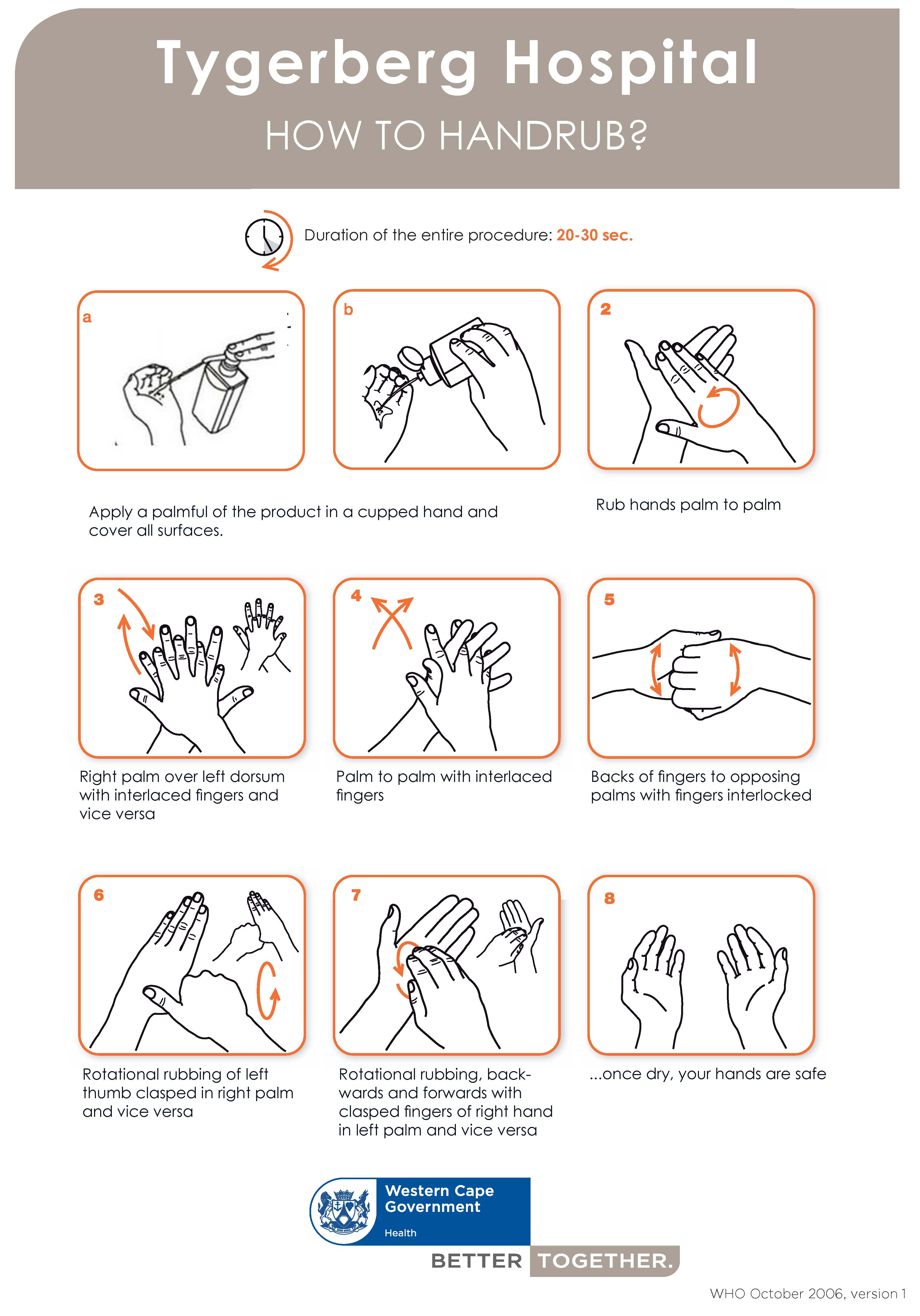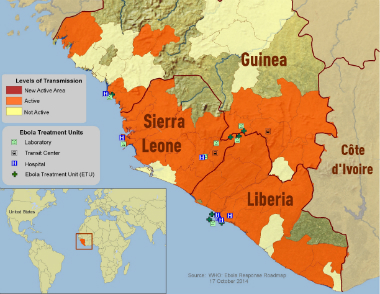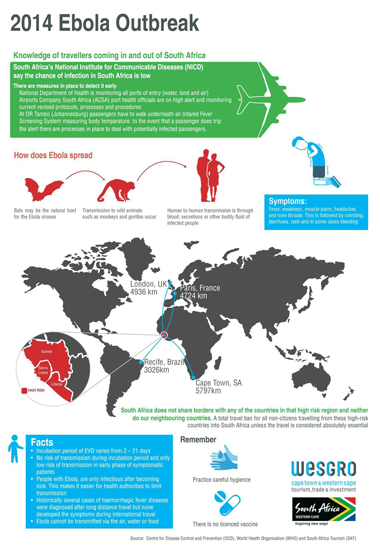Ebola: Protect Yourself by Knowing the Facts
(Western Cape Government)
What is Ebola?
Ebola virus disease (EVD) was formerly known as Ebola haemorrhagic fever and is a severe, often fatal illness in humans and non-human primates (monkeys, gorillas and chimpanzees).
How is it Transmitted?
The Ebola virus can spread through direct contact (through broken skin or mucous membranes including the nose, mouth and eyes) with the blood or any body fluids of an infected person, so remember:
- Do not touch the blood or body fluids of a person who is sick with or has died from Ebola.
- Do not touch contaminated objects, like needles.
- Avoid touching infected animals, their blood or other body fluids, or their meat.
Ebola virus is not spread in the air, so simply being in the same room as an infected person without having direct contact as described above is not a risk for infection.
People Are Most at Risk if They:
- Have recently visited a country with confirmed Ebola cases.
- Have been in contact with a person known or suspected to have Ebola.
- Begin to have symptoms (if this happens they should seek medical care immediately).
The Outbreak in West Africa
The current outbreak of Ebola in West Africa is the largest known outbreak of Ebola. It was first reported in March 2014, and involves four countries: Guinea, Liberia, Sierra Leone and Nigeria.
Experts are working together on an international response to control the outbreak and have already proven, as with the case of Nigeria, that the disease can be contained.
What Are the Risks of Becoming Infected?
During EVD outbreaks, those at highest risk include healthcare workers and the family members or friends in close contact with infected individuals – because they are in close contact with the infectious secretions and bodily fluids when caring for ill persons.
Furthermore, the risk of a traveller contracting Ebola is very low in the absence of direct contact with the blood or body fluids of an infected person or animal.
Travellers must have a valid yellow fever vaccination certificate and take routine precautions to prevent infections including malaria prophylaxis, preventing mosquito bites, regular hand washing with clean water and soap, and adhering to safe food practices.
What is the Risk to People in South Africa?
The risk of Ebola virus disease spreading to South Africa is considered to be low.
What is the Current Situation in the Western Cape and South Africa?
Currently, there have been no reported cases of EVD in the Western Cape or South Africa.
Even though the Western Cape is unlikely to have such cases, the Western Cape Government Department of Health has put various measures in place to ensure readiness to manage an imported case of EVD.
All the important roleplayers (Communicable Disease Control, Port Health Services, Emergency Medical Services etc) are working together to ensure the early detection, reporting and management of a suspected EVD case.
Tygerberg Hospital is the dedicated referral centre in the province to manage and treat a suspected EVD case. The facility has specialists and trained staff who are able to manage such cases.
Suspected viral haemorrhagic fever (VHF) cases, for example Ebola, seen at other hospitals in the Western Cape will be managed and treated in consultation with the infectious disease specialist / VHF consultant at Tygerberg Hospital.
Our South African Port Health authorities are on high alert for ill persons with EVD-compatible symptoms who have travelled from West Africa.
What if I Have Travelled to the Affected Areas and Developed Early Signs of the Ebola Virus Disease?
Access healthcare immediately and inform the healthcare worker of your travel history and the level of contact with suspected or confirmed EVD cases.
You will be isolated and assessed by a healthcare worker (doctor) in consultation with the Infectious Disease Specialist.
If your symptoms are compatible with EVD, a blood sample will be collected to confirm the infection.
What are the Signs and Symptoms of Someone who has Contracted Ebola?
Ebola symptoms can look a lot like other diseases like malaria, typhoid fever and cholera. A person infected with Ebola is not contagious until symptoms appear.
The onset of symptoms of Ebola is sudden and typically includes:
- Fever (greater than 38.6°C).
- Severe headache.
- Muscle pain and intense weakness.
As the patient’s condition worsens, symptoms include:
- Vomiting.
- Diarrhoea.
- Stomach pain.
- Unexplained bleeding or bruising.
Symptoms may appear anywhere from two to 21 days after exposure to Ebola but the average is eight to 10 days. Patients are not contagious during the incubation period.
Recovery from Ebola depends on the patient’s immune response. People who recover from Ebola infection develop antibodies that last for at least 10 years.
How is Ebola Diagnosed?
If a person has the early symptoms of Ebola and there is reason to believe that Ebola virus disease should be considered, the patient should be isolated and public health officials notified. A blood sample can be tested to confirm infection.
A specialised laboratory at the National Institute for Communicable Diseases (NICD) in Johannesburg is able to test for Ebola virus disease.
EVD can only be diagnosed once a person develops signs and symptoms of the disease.
How is Ebola Treated?
Currently there are no specific vaccines or medicines (such as antiviral drug) that have been proven to be effective against Ebola.
Symptoms of Ebola are treated as they appear. The following basic interventions, when used early, can significantly improve the chances of survival:
- Providing intravenous (IV) fluids and balancing electrolytes (body salts)
- Maintaining oxygen status and blood pressure

- Doing blood transfusions
- Treating other infections if they occur
How to Protect Yourself and Your Loved Ones:
- Practice careful hygiene. For example, wash your hands with soap and water or an alcohol-based hand sanitiser.
- Avoid contact with blood and body fluids of any person, particularly someone who is sick.
- Do not handle items that may have come in contact with an infected person’s blood or body fluids.
- Do not touch the body of someone who has died from Ebola.
- Do not touch bats and nonhuman primates or their blood and fluids and do not touch or eat raw meat prepared from these animals.
Prevention and Containment at Healthcare Facilities:
When cases of the disease do appear, there is increased risk of transmission within healthcare settings. Therefore, healthcare workers must be able to recognise a case of Ebola and be ready to use appropriate infection control measures.
The aim of these techniques is to avoid contact with the blood or body fluids of an infected patient. Appropriate procedures include:
- Isolation of patients with Ebola from contact with unprotected persons.
- Wearing of protective clothing (including masks, gloves, impermeable gowns, and goggles or face shields) by persons caring for Ebola patients.
- The use of other infection-control measures (such as complete equipment sterilisation and routine use of disinfectant).
- Avoid touching the bodies of patients who have died from Ebola.
Western Cape Minister of Health, Theuns Botha, has assured the public that the province is still Ebola-free and urged people to support Government's Ebola prevention strategies to ensure our safety and protection.
Watch this video to hear expert opinions on the Western Cape's readiness to deal with possible Ebola cases in the province should they appear.
View the Ebola information pamphlet in Afrikaans, English or isiXhosa (pdf, 211KB).
Read more about the Western Cape Government's Ebola prevention strategies (pdf, 1.83MB).
For more information, please visit: www.westerncape.gov.za/dept/health or call 012 395 9636 / 7
Follow Us:






